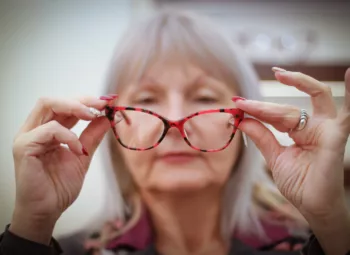
Cataracts are the number one cause of blindness worldwide. It’s estimated that more than 24.4 million people in the U.S. over the age of 40 are affected by this degenerative eye disease. These statistics may come as a shock to some, because while often associated with aging, cataracts can begin to develop at any age. In this article, we explain the most common signs that it is time to seek treatment and discuss the best age for cataract surgery.
How To Tell When It’s Time for Cataract Surgery
Laser eye surgery is the best and only way to remove cataracts permanently. During this minimally invasive, out-patient procedure, your ophthalmologist removes your natural eye lens and replaces it with an intraocular lens (IOL). This not only permanently removes the cataract and ensures it will never grow back, but also restores your vision at near, intermediate and far-away distances.
While there’s no universally recommended age for the procedure, understanding the signs that indicate it’s time for cataract surgery is crucial in ensuring your vision is not permanently lost. These are the most common signs that it’s time for cataract surgery.
Poor Vision Makes It Challenging to Complete Everyday Tasks

During the earlier stages of cataract development, many patients don’t notice any vision symptoms. In fact, some people go years without it affecting their vision. Unfortunately for many, once vision symptoms have become noticeable, the disease is at a much more advanced stage, meaning without cataract surgery, they will only continue to get worse.
Cataracts can cause a wide range of vision symptoms that make it challenging to complete everyday tasks, ultimately interfering with your quality of life, or even increase risk of accidents and injuries. Here are some of the most common vision symptoms associated with cataracts:
- Blurry vision that might appear dirty or scratched
- Reading is difficult without bright light
- Lights are too bright, or surrounded by halos and glare
- Reduced night vision
- Inconsistent glasses or contact lenses prescription
- And more
If vision issues are interfering with your daily routine, you should consult with an eye doctor immediately to schedule a comprehensive eye exam. Annual eye exams are highly encouraged for anyone over the age of 40 even without obvious vision symptoms. These routine screenings help ensure that cataracts, or any other age-related eye condition are diagnosed and treated before any permanent damage to your vision is caused.
Driving at Night Is Difficult

One of the most common cataract symptoms is difficulty driving at night. If you have cataracts, the glare from lights can create a “halo” effect in your vision. This means that oncoming headlights, streetlamps, and traffic lights can potentially obscure your eyesight.
Cataracts also cause blurred, cloudy, and double vision, which adds another layer of difficulty to nighttime driving. When you can’t clearly make out oncoming traffic or possible hazards, this makes driving a risk. If your night vision is diminishing and driving at night has become difficult, it’s important to talk to an ophthalmologist about cataract surgery as soon as possible.
Your Vision Prescription Is Unstable

Corrective eyewear is a temporary fix to blurry eyesight. However, as cataracts develop and your vision quality becomes even worse, your prescription glasses will eventually become ineffective. Changes in your vision prescription can be a big indication that it’s time for cataract surgery. If you notice that your eyeglasses are no longer helping you see clearly, it’s important to tell your eye doctor about this immediately.
You Start Experiencing Light Sensitivity

As your cataracts develop, you might begin experiencing light sensitivity. The glare caused by sunlight can make it challenging to complete daily activities, especially outdoor tasks. In addition to obscuring your vision, light sensitivity can also cause headaches and discomfort. To ensure cataract symptoms like light sensitivity don’t interfere with your quality of life, it’s important to tell your doctor about any changes in vision as soon as possible.
Is it Time to Have Cataract Surgery?
It’s important to tell your eye doctor about any changes in your vision as soon as possible, especially if your vision is negatively affecting your quality of life in any way. While your age can increase your risk of developing a degenerative eye disease, there is no one-size-fits-all answer to the best age to have cataract surgery.
The best way to determine when to have cataract surgery is by consulting with an ophthalmologist. Use the form below to schedule a consultation with our highly experienced and trusted cataract surgeon in Union City.
Schedule a Cataract Surgery Consultation in Union City
Take the next step towards restoring your vision by scheduling a consultation about your cataracts.
"*" indicates required fields





